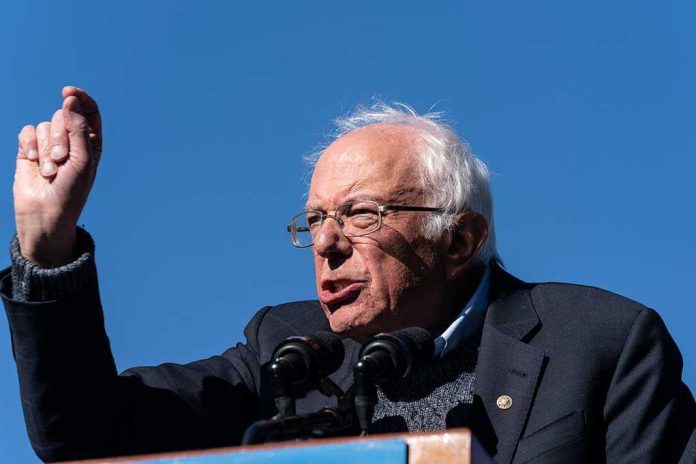
Bernie Sanders’s stark critique of Kamala Harris’s 2024 campaign strategy has reignited debates within the Democratic Party, raising questions about its future direction and priorities.
Story Overview
- Bernie Sanders criticizes Kamala Harris’s 2024 campaign for not addressing working-class concerns.
- Sanders believes Harris’s reliance on wealthy donors weakened her campaign.
- Harris’s loss to Donald Trump in 2024 is attributed partly to campaign missteps.
- Sanders’s remarks highlight divisions within the Democratic Party.
Sanders’s Critique and Its Implications
Bernie Sanders did not hold back his criticism of Kamala Harris’s 2024 presidential campaign during an appearance on ‘The Tim Dillon Show’. Sanders argued that Harris’s campaign failed to prioritize the economic issues facing working-class Americans. This misstep, he said, contributed to her loss to Donald Trump. Sanders’s direct commentary underscored ongoing tensions within the Democratic Party, as he pointed out that Harris’s campaign was overly reliant on wealthy donors, which alienated many of the party’s base.
Bernie Sanders Nukes Kamala Harris Over Lackluster Campaign: 'Allowed Trump to Win' https://t.co/tLBW5MK0WU
— Mediaite (@Mediaite) October 22, 2025
Sanders’s remarks have sparked renewed discussions about the Democratic Party’s strategic direction. Some party members believe the party should focus more on economic populism to regain competitiveness in future elections. Sanders’s critique is not just an attack on Harris’s strategy; it’s a call for the party to reconnect with its working-class roots and address the economic anxieties that many Americans face.
The 2024 Election Context
The 2024 election was a tumultuous time for the Democratic Party. President Joe Biden withdrew from the race due to health concerns, thrusting Kamala Harris into the role of presumptive nominee under immense pressure. Harris’s campaign was hastily assembled, leaving little time for strategic recalibration. Despite Sanders’s endorsement, urging Harris to focus on working-class issues, the campaign struggled to find a cohesive message. This was compounded by internal party divisions over whether to highlight economic or social issues.
The election took place against a backdrop of economic uncertainty and polarization. The Republican Party, led by Trump, capitalized on these conditions by positioning itself as the champion of the working class. Harris’s campaign, meanwhile, failed to adequately address these economic concerns, a point Sanders emphasized in his critique.
Intra-Party Divisions and Strategic Reevaluation
Sanders’s critique has exposed and possibly widened existing rifts within the Democratic Party. His comments point to a fundamental disagreement over the party’s priorities and messaging. While some leaders argue that social issues remain critical for mobilizing key constituencies, others, like Sanders, insist that economic messaging is essential for winning back swing states and working-class voters. This debate is reflective of a broader struggle within the party to balance these competing priorities.
Harris’s recent memoir, released in October 2025, adds another layer to the discussion. In it, she reflects on the campaign and acknowledges that economic issues were indeed a critical factor in her loss. Her candid admissions may fuel further introspection and strategic reevaluation within the party as it prepares for future elections.
Long-Term Implications for the Democratic Party
The implications of Sanders’s critique are significant for the Democratic Party’s future. In the short term, his remarks have prompted a renewed examination of the party’s strategy and priorities. This could lead to shifts in leadership or campaign tactics, especially if economic populism gains traction as a unifying strategy. In the long term, Sanders’s call for a focus on working-class issues may influence the party’s platform and policy priorities, affecting the landscape for the 2028 presidential contenders.
The fallout from the 2024 election and Sanders’s critique highlights the challenges the Democratic Party faces in maintaining a cohesive coalition. As the party continues to grapple with its identity, these debates will likely shape its approach to addressing the economic and social issues that resonate with American voters.
Sources:
MEAWW: Sanders’s podcast remarks and critique of Harris’s campaign.
Salon: Analysis of Sanders’s appearance on Tim Dillon’s podcast.
Fox News: Excerpts from Harris’s memoir and Sanders’s advice.
Economic Times: Sanders’s post-election analysis and critique.




